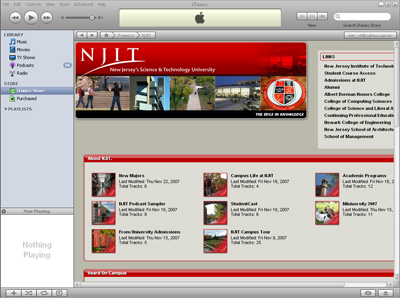Will 2007 be the year of the podcast?

The New Oxford American Dictionary selected "podcast" as the "Word of the Year" in 2005. But when the Pew Research Center did a survey in 2006, they found that only 12% of web users had ever used a podcast and only 1% downloaded them daily. Not exactly an explosion.
Don't get the impression from this week's posts that iTunes is the only podcasting game in town. There are other sources for podcasts. You can find lots of them at content sources - like National Public Radio (NPR) podcasts or Leo Laporte's TWiT network for tech programs. Laporte calls them "netcasts" - a term he coined when Apple began to claim they owned "podcast."
You can play an mp3 (audio-only) podcast in any variety of players - Windows Media Player, WinAmp etc. - and most video ones too. The "enhanced " podcasts - audio with synchronized still graphics (PowerPoint slides, photos etc.) are m4a and m4b files and those do require the iTunes player (if you know otherwise, PLEASE post below).
But the iTunes Music Store made it easy and that makes a big difference in people adopting a new technology. Personally, I think it is time for Apple to change some things in the "Music Store", since it sells a lot of non-music programming these days, and the podcasts are almost all free. Never liked the idea that even in our iTunes U version you still click "Get Song."
You can find the Metropolitan Museum of Art podcasts there. The first one I listened to was some of Van Gogh's letters read by Kevin Bacon. While you're museum browsing in New York City, stop by the the Museum of Modern Art and the MoMA Think Modern Lectures and their Art Mobs Guides to works at the museums. The NY Times video podcasts offers David Pogue's Circuits technology column.
Last point: There are lots of podcasts out there from colleges that we should be looking at that are NOT using iTunes. I'll put in a little plug here for Virginia Tech (my son is a student there) who have a nice podcast program at podcasts.vt.edu. You can listen to podcasts right there or copy the RSS feed URL and paste it into whatever podcast aggregator application you might use. We do something similar with the 3 podcasts that we feature on the NJIT home page. If you click one, it will take you to the NJIT on iTunes homepage, but rather than force visitors to click the GUEST login link, we offer those three right there as embedded Flash audio files. At this point, the Flash plugin is more ubiquitous than iTunes and you don't want to lose people because they don't want to go through the iTunes download process. (It's also surprising how many people won't download iTunes to their computer because "I don't have an iPod," so there is a learning or adoption curve to all this that is steeper than I expected.
Of course, we do want people to SUBSCRIBE to a podcast series so that they get new content without having to come back to the site. That has been accepted easily by students using our course section. For the rest, it sort of like getting people to comment on your blog - not easy.

 In our year of podcasting, one of our early adopters at NJIT was Dr. Norbert Elliot. He posted several of his courses on our beta site (including
In our year of podcasting, one of our early adopters at NJIT was Dr. Norbert Elliot. He posted several of his courses on our beta site (including